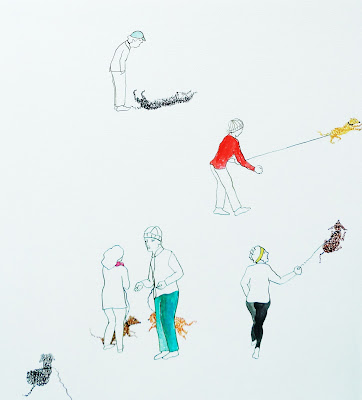On 32nd Street in Manhattan, I quickly slipped into an elevator just before the doors closed. I held the door open for a few young Korean men following behind me. As I turned my head, one of them said,
“I thought you were a young woman, but you’re actually an ajumma (middle-aged lady)!”
I thought to myself, Well, at least he didn’t say grandma.
From behind, people sometimes mistake me for a younger woman. That’s thanks to my father’s nagging when I was young.
“Don’t walk with your hands behind your back or in your pockets. Keep your back and neck straight. If you don’t walk with good posture, by the time you’re fifty, your back will be hunched, your legs will be bent, and you’ll lose your charm as a woman.”
So every morning, I walk with my head held high, back straight, and arms swinging. But as I look up at the sky, enjoying my walk, my husband nudges me and says,
“Watch out for poop.”
So I can’t walk with my head up anymore—especially on days when the snow melts. If I step in dog poop, my mood for the whole morning is ruined, and I get annoyed at the dog owners who didn’t clean up after their pets.
A long time ago, I went on a package tour in Korea on a chartered bus. A young woman sitting behind me kept calling home nonstop.
“Is my baby okay? Did she eat? Does she miss Mommy? Oh, I miss my baby so much! Muah muah muah~”
She kept kissing the phone and making a big fuss. Later, I found out her “baby” was actually a dog.
Some people carry their dogs in baby slings, push them in strollers, or even put them in swings. I once saw a comment online from an older woman who couldn’t take it anymore and said,
“When did humans start giving birth to dogs?”
My neighbor has a dog named Polly. In winter, I was bundled up in a thick coat, with only my eyes and nose showing. But even from far away, she recognizes me and jumps up and down in joy. Even though my husband doesn’t like dogs—he sees them as dirty strays or food—Polly still runs up to him happily. It’s hard not to love such a sweet dog.
“Why aren’t you married? What kind of man are you looking for?”
Friends used to ask me this when I was single. If I wasn’t careful with my answer, I’d hear,
“She’s too picky, that’s why she’s still single. Tsk tsk.”
So I always gave the same clear reply:
“Someone who eats well, sleeps well, and poops well!”
“That’s a dog!”
They’d say, rolling their eyes. Then I’d answer,
“There are lots of people worse than dogs. If he’s at least like a dog, I’d be lucky.”
Every morning when I go jogging, I see the same dogs who are always happy to see me. They’re so cute and lovable. But because of their poop, I have to walk with my head down, ruining my nice, young-looking posture. And for that, I really don’t like the dog moms and dads who don’t clean up after their pets.

+Are+you+ok.jpg)